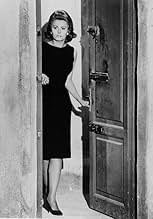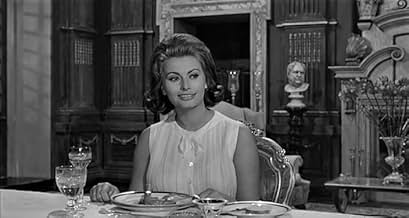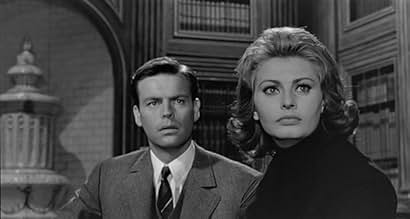IMDb RATING
6.7/10
696
YOUR RATING
An insane German war criminal lives in a secluded house owned by his rich father who lets him think the war is still on, some 15 years after the fact.An insane German war criminal lives in a secluded house owned by his rich father who lets him think the war is still on, some 15 years after the fact.An insane German war criminal lives in a secluded house owned by his rich father who lets him think the war is still on, some 15 years after the fact.
- Director
- Writers
- Stars
- Awards
- 2 wins & 1 nomination total
Carlo Antonini
- Police Official
- (uncredited)
Antonia Cianci
- Maid
- (uncredited)
Alfredo Franchi
- Groundskeeper
- (uncredited)
Roberto Massa
- Chauffeur
- (uncredited)
Osvaldo Peccioli
- Cook
- (uncredited)
Lucia Pelella
- Groundskeeper's wife
- (uncredited)
- Director
- Writers
- All cast & crew
- Production, box office & more at IMDbPro
Featured reviews
Perhaps because I saw this film dubbed in Italian with English subtitles and missed the familiar voices of Fredric March, Maximilian Schell, and Robert Wagner I was put off somewhat. But The Condemned Of Altona just did not rise to what I was expecting. Or maybe it was Jean-Paul Sartre's view of the world.
Whatever it was his ideas just did not translate well to the big screen. Meet the family Gerlach, father Fredric March big German industrial tycoon and his children Maximilian Schell, Robert Wagner, and Francoise Prevost. Germany may have lost the war, but her natural resources and the need for an anti-Communist bulwark in the Cold War have made her richer than ever, if de-Nazified.
March has been told he's terminally ill and has six months tops. He's troubled about his choices. The younger son Robert Wagner is not fit material for a tycoon and in the patriarchal society Francoise Prevost is out of the question.
Then there's Maximilian Schell who has self secluded and deluded. He's a wanted war criminal from World War II and he's imposed an exile on himself. He believes because he knows no better that Germany is a vast rubble.
Bringing him out of his exile is Wagner's new wife Sophia Loren who's been wondering about that locked section of that Gothic manor the Gerlachs have for themselves.
As for the rest all I can say is Schell's guilt is the engine that drives the rest of the film. The best part of the film is something that could not be done on stage. Schell finally lose and seeing with his own eyes, the prosperity and the bustling night life that was Hamburg. Wonder if he went to the clubs and found some musicians from Liverpool who would shake the world soon?
I did see this on stage at Lincoln Center a couple of years after the film had been made of Jean-Paul Sartre's play with George Coulouris heading the cast as the family patriarch. As he is often on screen, Coulouris was mesmerizing in self absorption and monomania about seeing his industrial complex carrying on. By contrast March seemed dull and lifeless and this has to rank as one of his lesser films. But not to single him out alone, the whole cast was the same way with the exception of Schell. But he's got the best part of a man who had to enlist in the army after his father got him off from protecting a Rabbi to a man who committed war atrocities on the Russian front.
Sartre was saying that war itself can make people do evil things. And that the true guilty parties never saw any punishment, on the contrary like March they triumphed in defeat.
In other words, what a world.
Whatever it was his ideas just did not translate well to the big screen. Meet the family Gerlach, father Fredric March big German industrial tycoon and his children Maximilian Schell, Robert Wagner, and Francoise Prevost. Germany may have lost the war, but her natural resources and the need for an anti-Communist bulwark in the Cold War have made her richer than ever, if de-Nazified.
March has been told he's terminally ill and has six months tops. He's troubled about his choices. The younger son Robert Wagner is not fit material for a tycoon and in the patriarchal society Francoise Prevost is out of the question.
Then there's Maximilian Schell who has self secluded and deluded. He's a wanted war criminal from World War II and he's imposed an exile on himself. He believes because he knows no better that Germany is a vast rubble.
Bringing him out of his exile is Wagner's new wife Sophia Loren who's been wondering about that locked section of that Gothic manor the Gerlachs have for themselves.
As for the rest all I can say is Schell's guilt is the engine that drives the rest of the film. The best part of the film is something that could not be done on stage. Schell finally lose and seeing with his own eyes, the prosperity and the bustling night life that was Hamburg. Wonder if he went to the clubs and found some musicians from Liverpool who would shake the world soon?
I did see this on stage at Lincoln Center a couple of years after the film had been made of Jean-Paul Sartre's play with George Coulouris heading the cast as the family patriarch. As he is often on screen, Coulouris was mesmerizing in self absorption and monomania about seeing his industrial complex carrying on. By contrast March seemed dull and lifeless and this has to rank as one of his lesser films. But not to single him out alone, the whole cast was the same way with the exception of Schell. But he's got the best part of a man who had to enlist in the army after his father got him off from protecting a Rabbi to a man who committed war atrocities on the Russian front.
Sartre was saying that war itself can make people do evil things. And that the true guilty parties never saw any punishment, on the contrary like March they triumphed in defeat.
In other words, what a world.
It was very long ago, but this film touched me deeply. A became obsessed with Shostakovich's 11th Symphony, and remember vividly some scenes. When Maximillian Schell is finally "released" and goes out into the city (Hamburg?) to see what Germany has become, he is repulsed. When Frederich March is told he will die, he is solemn. The plot, that they have hidden their son because he is a wanted war criminal. That they collaborated willingly with the Nazis, as an industrial power. Perhaps I have forgotten important details. But the movie resonates with me.
While this film was not entirely successful, there are scenes that will stay in your mind forever! If you liked Von Trier's "Zentropa", you will like this film on a similar theme.
When a movie from 1962 has less than 200 votes on IMDb, what does it mean? Directed by legendary De Sica, and starring great Sophia Loren... it must be a terrible failure? Well, it isn't.
Having read Sartre's play "The Condemned of Altona", it is my impression that the movie is very faithful to its atmosphere. There are some changes, of course: instead of concentrating exclusively on torturing his characters inside the mansion (as Sartre does), De Sica takes advantage of possibilities of film, adding outdoor scenes.
I don't want to reveal the plot, although it is very interesting. I recommend reading the play first, since the relations between characters will be clearer then. Anyway, see this movie if you get the chance!
Having read Sartre's play "The Condemned of Altona", it is my impression that the movie is very faithful to its atmosphere. There are some changes, of course: instead of concentrating exclusively on torturing his characters inside the mansion (as Sartre does), De Sica takes advantage of possibilities of film, adding outdoor scenes.
I don't want to reveal the plot, although it is very interesting. I recommend reading the play first, since the relations between characters will be clearer then. Anyway, see this movie if you get the chance!
... from director Vittorio De Sica. German shipping magnate Fredric March learns that he has six months left to live. He summons his son Robert Wagner and daughter-in-law Sophia Loren to his palatial estate in order to set plans for his passing. Loren, who resents Germany's Nazi past and March's role in it, learns that March's older son (Maximilian Schell), believed long dead, has lived in seclusion since the end of the war, so she sets out to learn why he is hidden away. Also with Francoise Prevost and Gabriele Tinti.
This must have been a major European release at the time, as De Sica was one of the most respected directors, and Loren and Schell had just won the lead acting Oscars. It's heavy stuff, with the examination of German culpability for Nazi atrocities a thorny subject. The version I watched was in Italian with subtitles, so it was odd seeing March, Schell and Wagner dubbed with others' voices.
This must have been a major European release at the time, as De Sica was one of the most respected directors, and Loren and Schell had just won the lead acting Oscars. It's heavy stuff, with the examination of German culpability for Nazi atrocities a thorny subject. The version I watched was in Italian with subtitles, so it was odd seeing March, Schell and Wagner dubbed with others' voices.
Did you know
- TriviaSpencer Tracy was offered but declined the role of Albrecht von Gerlach.
- GoofsNazi uniforms were banned after the war, yet Franz walks through the city without being arrested or beaten up. He gets a few strange looks but is otherwise ignored.
- Alternate versionsEvery reference to National Socialism was cut from the West German version in 1962.
- How long is The Condemned of Altona?Powered by Alexa
Details
- Release date
- Countries of origin
- Languages
- Also known as
- The Condemned of Altona
- Filming locations
- Production companies
- See more company credits at IMDbPro
Box office
- Gross US & Canada
- $2,398,000
- Runtime
- 1h 54m(114 min)
- Color
- Sound mix
- Aspect ratio
- 2.35 : 1
Contribute to this page
Suggest an edit or add missing content




























